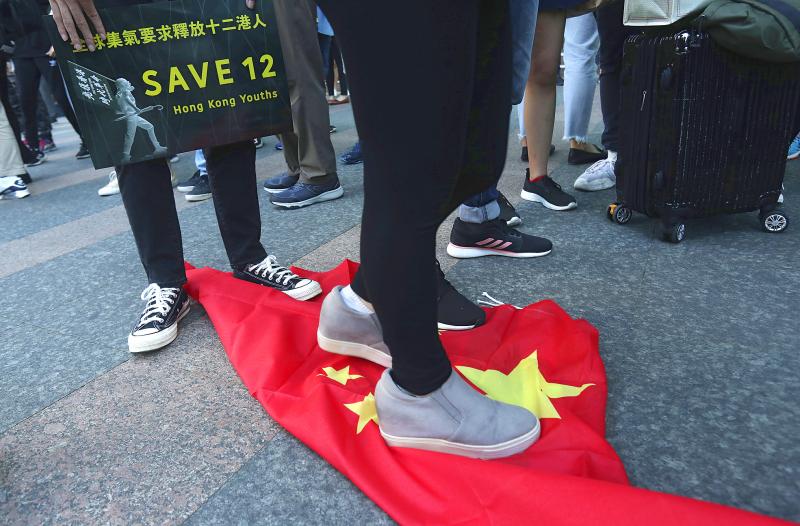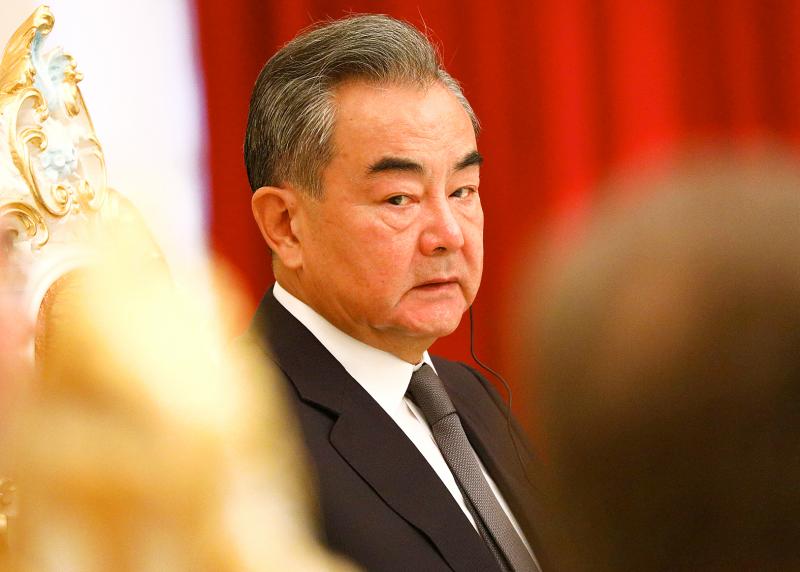Some uplifting news last week: Taiwan Innovative Space received approval to carry out three launches later this year from a site in southern Australia. This program may well develop into a full-blown production and launch capability in Australia in coming years, according to Australian news reports.
Simultaneously, the Asia Times reported that Washington had pressured Taiwan to cease development of a locally-based launch capability using rockets developed in Taiwan. According to the Asia Times, US officials said that “these new rockets could put the island into direct conflict with China as related technologies could easily be weaponized.”
The report said that Washington warned it would stimulate Beijing to conduct more flights and other provocations around Taiwan.

Photo: AP
Official Washington: Taiwan! Do more to defend yourself! Also official Washington: But not that way!
It is true that a rocket launch capability could be weaponized. Indeed, we’re already weaponizing related technology because Taiwan manufactures its own missiles for use against China, something Beijing knows perfectly well. It is hard to see how possessing rockets could make that worse.
It is easy to see, however, how Taiwan possessing a native space launch capability would both reduce Taiwan’s demand for US launches (currently carried out on SpaceX rockets) and eventually, compete with US space launch firms in the world market. What’s Washington’s real motivation here?

Photo: EPA-EFE
An indigenous rocket program can serve as a test bed for developing and improving weapons systems, from communications and guidance systems to missile propulsion. It can also help develop the trained personnel Taiwan needs to make and operate such systems, and create new products for export. Indeed, Taiwan already has plans to help other countries with work on making and testing instruments and payloads for satellites.
But the US said a rocket program that may help Taiwan’s defense might provoke Beijing? Explain, please, how Taiwan can take steps to improve its defense without provoking Beijing.
POLICY, NOT VISCERAL REACTION
There’s a simple rule guiding this discourse: everything provokes Beijing, from phone calls to vaccine donations to displays of Republic of China flags to the use of the word “Taiwan” to arms sales to arrivals of US officials. Any exchange with the outside world “provokes Beijing.”
Why? Because “being provoked” is a policy, not a visceral emotional reaction. Beijing invokes it to deter actions on behalf of Taiwan and other places it wants to aggress on. It mesmerizes policymakers and observers and commentators into imagining that Beijing’s angry reaction is really something important.
For Beijing, US responses that worry about Taiwan “provoking” China are a gold mine of power and control. By “being provoked” Beijing transfers the burden of enforcing the elusive “status quo” onto Washington, which means that it transfers the costs of actions by either Washington or Taiwan onto the US-Taiwan relationship. This lets Beijing shape the US-Taiwan relationship and US thinking on Taiwan.
It also means that there is a constant flow of verbiage arguing that the US should not do X or Y because some important event is occurring in the US-China relationship. Since something is always happening in that relationship, by this logic, the US should never take any action.
POOR, PUT-UPON BEIJING
Watch China carefully — each time it is “provoked” what costs does it impose on itself? “Being provoked” is something that for the last two decades has taken place largely in the media. By shaping the discourse thus, Beijing does not have to take costly, concrete actions that might have negative effects on its economy or relations with other nations.
“Being provoked” is also used to shape media representations of Beijing — to teach the international media to present Taiwan as a troublemaker that is constantly abusing poor, put-upon Beijing.
Indeed, the international media regularly carries Beijing’s water for it, describing actions or events as “sure to anger Beijing!” long before they do so, and of course, trotting out the hackneyed “amidst rising tensions” which I am sure archaeologists have found inscribed on a wall somewhere in the ruins of Pompeii.
The media seldom firmly assigns the cause of the tensions to Beijing, and never notes that “tensions” are policy, to be scaled up or down as needed.
As I have noted many times, when Beijing does not display anger in the wake of a “sure to anger China!” event, the media never returns to the topic to report that nothing happened. This leaves the international readership with the idea that Beijing is always in an abnormal state of anger over Taiwan’s actions, when such anger is mere policy, like fixing quotas for peach imports or deciding acceptable particulate levels for factory emissions.
This trained media response, so many dogs salivating when the bell is rung, not only functions to present Beijing as the victim, it also highlights for Beijing events and actions that it should be responding to and signals that the media will criticize other actors, not Beijing, for taking action.
Remember when President Tsai Ing-wen (蔡英文) phoned and congratulated a newly-elected Donald Trump? The media and commentariat had a total meltdown, with everyone suddenly becoming a Taiwan expert for the duration of the controversy.
Meanwhile, what did China say initially? China’s foreign minister, Wang Yi (王毅), called it a “small action” that “cannot change China’s standing in international society,” according to a Washington Post report. Later, after the international media storm, Zhongnanhai made great noise, summoning the US ambassador.
REDUCED CULPABILITY
What concrete response did China have after this earthshaking event? Nothing. On all sides, it is forgotten as if it never happened, having moved on to the next big “I am now an expert in ... !” event.
One key aspect of the “being provoked” discourse is that it assigns reasons for China’s actions to things that Taiwan or the US does. It is commonplace to write that Beijing did this or that in response to something the US did that Beijing didn’t like.
This media response thus creates a reasonable-seeming explanatory framework in which Beijing is not responsible for its own actions but instead is merely reacting to provocations by others. This reduced agency results in reduced culpability.
Buying into the “being provoked” narrative makes it more difficult for the international media to present China as the aggressor state.
Thus, each time the US says to anyone, but especially to Taiwan, that “you’re provoking Beijing!” it awards victory points to China. Same for the international media.
The truth is simple: when Beijing finally moves on Taiwan, it will do so in its own time, for its own internal reasons and it will grab any excuse to justify its move to the world and its own people, or none at all.
It is saddening to think, on that terrible day when Beijing finally starts the war it is hurtling toward, that numerous docile, well-trained commentators in the international media will be blaming Taiwan for resisting aggression and fighting for democracy.
Thanks in advance, guys.
Notes from Central Taiwan is a column written by long-term resident Michael Turton, who provides incisive commentary informed by three decades of living in and writing about his adoptive country. The views expressed here are his own.

Jacques Poissant’s suffering stopped the day he asked his daughter if it would be “cowardly to ask to be helped to die.” The retired Canadian insurance adviser was 93, and “was wasting away” after a long battle with prostate cancer. “He no longer had any zest for life,” Josee Poissant said. Last year her mother made the same choice at 96 when she realized she would not be getting out of hospital. She died surrounded by her children and their partners listening to the music she loved. “She was at peace. She sang until she went to sleep.” Josee Poissant remembers it as a beautiful

Before the last section of the round-the-island railway was electrified, one old blue train still chugged back and forth between Pingtung County’s Fangliao (枋寮) and Taitung (台東) stations once a day. It was so slow, was so hot (it had no air conditioning) and covered such a short distance, that the low fare still failed to attract many riders. This relic of the past was finally retired when the South Link Line was fully electrified on Dec. 23, 2020. A wave of nostalgia surrounded the termination of the Ordinary Train service, as these train carriages had been in use for decades

Lori Sepich smoked for years and sometimes skipped taking her blood pressure medicine. But she never thought she’d have a heart attack. The possibility “just wasn’t registering with me,” said the 64-year-old from Memphis, Tennessee, who suffered two of them 13 years apart. She’s far from alone. More than 60 million women in the US live with cardiovascular disease, which includes heart disease as well as stroke, heart failure and atrial fibrillation. And despite the myth that heart attacks mostly strike men, women are vulnerable too. Overall in the US, 1 in 5 women dies of cardiovascular disease each year, 37,000 of them

Politically charged thriller One Battle After Another won six prizes, including best picture, at the British Academy Film Awards on Sunday, building momentum ahead of Hollywood’s Academy Awards next month. Blues-steeped vampire epic Sinners and gothic horror story Frankenstein won three awards each, while Shakespearean family tragedy Hamnet won two including best British film. One Battle After Another, Paul Thomas Anderson’s explosive film about a group of revolutionaries in chaotic conflict with the state, won awards for directing, adapted screenplay, cinematography and editing, as well as for Sean Penn’s supporting performance as an obsessed military officer. “This is very overwhelming and wonderful,” Anderson